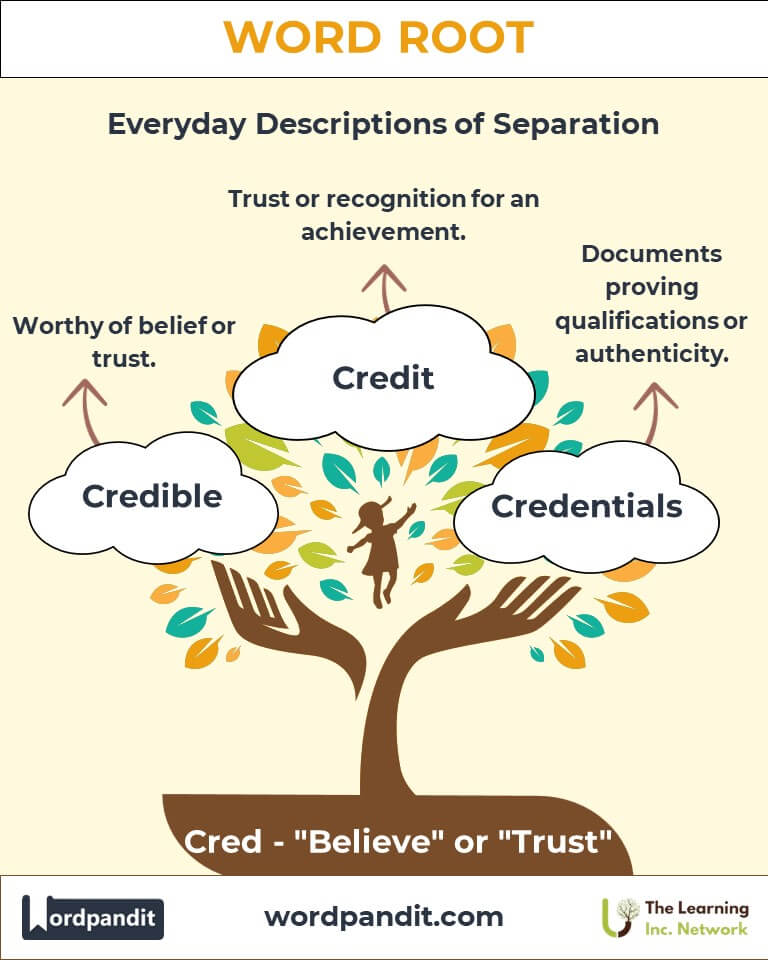Cred: The Root of Belief in Language and Trust
Explore the powerful word root cred, derived from the Latin word for "believe" or "trust." From words like "credible" to "credentials," this root builds a foundation for expressing trust, faith, and authenticity in both everyday language and specialized fields.

Table of Contents
- Introduction: The Essence of Cred
- Etymology and Historical Journey
- Mnemonic: Unlocking the Power of Cred
- Common Cred-Related Terms
- Cred Through Time
- Cred in Specialized Fields
- Illustrative Story: Cred in Action
- Cultural Significance of Cred
- The Cred Family Tree
- FAQs about the Cred Word Root
- Test Your Knowledge: Cred Mastery Quiz
- Conclusion: The Living Legacy of Cred
1. Introduction: The Essence of Cred
When you say someone is credible, you mean they are trustworthy and believable. The root cred, pronounced "krehd," comes from Latin, meaning "to believe." This root forms the foundation of numerous words in English, reflecting the themes of trust, authenticity, and belief. Whether you're verifying someone’s credentials or assessing the credibility of a story, cred remains a cornerstone of communication and integrity.

2. Etymology and Historical Journey
The root cred originates from the Latin verb credere, which means "to believe" or "to entrust." It evolved into various forms in medieval Latin and Old French before entering English in the Middle Ages. Over time, cred has influenced words relating to belief systems, trustworthiness, and authenticity, bridging both secular and spiritual contexts.
3. Mnemonic: Unlocking the Power of Cred
To remember cred, think of a golden certificate labeled "CRED," symbolizing trust and belief. This certificate serves as proof that something or someone is credible.
Mnemonic Device: “CRED is the golden key to trust and belief.”
4. Common Cred-Related Terms
- Credible (krehd-uh-bul): Worthy of belief or trust.
- Example: "The scientist provided credible evidence to support her theory."
- Credentials (kreh-den-shuhls): Documents or evidence proving one's qualifications or authenticity.
- Example: "He presented his credentials before assuming the leadership role."
- Credit (krehd-it): Trust or recognition for something achieved.
- Example: "She received full credit for her innovative design."
- Credulous (krehd-yoo-luhs): Gullible or overly willing to believe.
- Example: "The scam targeted credulous individuals unfamiliar with online fraud."
- Incredulous (in-krehd-yoo-luhs): Unwilling or unable to believe something.
- Example: "She gave an incredulous look when she heard the shocking news."
- Creed (kreed): A system of beliefs or guiding principles.
- Example: "The organization’s creed emphasizes equality and justice."
5. Cred Through Time
- Credo: Derived from Latin, meaning "I believe," this term once signified religious declarations and now represents guiding principles in various contexts.
- Credit: Initially tied to financial trust, this term has evolved to encompass acknowledgment and reputation in broader societal contexts.
6. Cred in Specialized Fields
- Finance:
- Creditworthiness: An assessment of one’s ability to repay loans, central to modern banking.
- Education:
- Academic Credits: Units earned toward completing a degree program.
- Marketing:
- Street Cred: Informal credibility within specific social or cultural groups.
- Law:
- Incredibility: The lack of trustworthiness, often cited in legal testimonies.
7. Illustrative Story: Cred in Action
When Maya applied for her dream job, she knew her credentials needed to stand out. She meticulously prepared her portfolio, ensuring every project reflected her credible expertise. During the interview, her clear explanations and the impressive quality of her work earned her immediate credibility. The hiring manager, impressed by Maya’s authenticity, entrusted her with the position. Maya’s story highlights how cred forms the basis of trust in professional achievements.
8. Cultural Significance of Cred
The root cred is deeply embedded in cultural and religious contexts. From ancient creeds outlining belief systems to modern terms like “street cred,” it signifies the importance of trust and authenticity in human interactions. Whether in faith, commerce, or social standing, cred continues to shape how societies function and connect.

9. The Cred Family Tree
- Fid (Latin: "faith, trust"):
- Fidelity: Faithfulness or loyalty.
- Confide: To trust someone with a secret.
- Ver (Latin: "truth"):
- Verify: To prove the truth of something.
- Veracity: Conformity to truth or facts.
- Cert (Latin: "sure"):
- Certify: To confirm or guarantee as true.
- Certain: Free from doubt.
10. FAQs About the Cred Word Root
Q: What does "cred" mean, and where does it originate?
A: The root "cred" means "to believe" or "to trust." It originates from the Latin verb "credere," which translates to "to entrust" or "to believe."
Q: What is the difference between "credible" and "incredulous"?
A: "Credible" means believable or trustworthy, while "incredulous" describes someone who is skeptical or unwilling to believe.
Q: Why are "credentials" important, and how do they relate to "cred"?
A: "Credentials" refer to documents or evidence proving someone's qualifications or authenticity. They derive from "cred," emphasizing the trust placed in such proofs.
Q: How does "credit" apply in finance and reputation?
A: In finance, "credit" refers to trust in a borrower’s ability to repay a loan. In reputation, it means recognition for accomplishments, like giving someone credit for an idea.
Q: What does "street cred" mean?
A: "Street cred" is a slang term for informal credibility or respect within a specific cultural or social group, such as in music or fashion communities.
11. Test Your Knowledge: Cred Word Root Quiz
1. What does "cred" mean?
2. Which term refers to someone overly willing to believe?
3. What is a "creed"?
4. What are "credentials"?
5. Which term means "worthy of belief"?
12. Conclusion: The Living Legacy of Cred
The root cred is integral to how we communicate trust, belief, and authenticity. Its influence spans languages and disciplines, shaping words that define human interactions. As trust continues to be a vital element of personal and professional relationships, the legacy of cred endures, connecting us through shared principles of belief and integrity.












